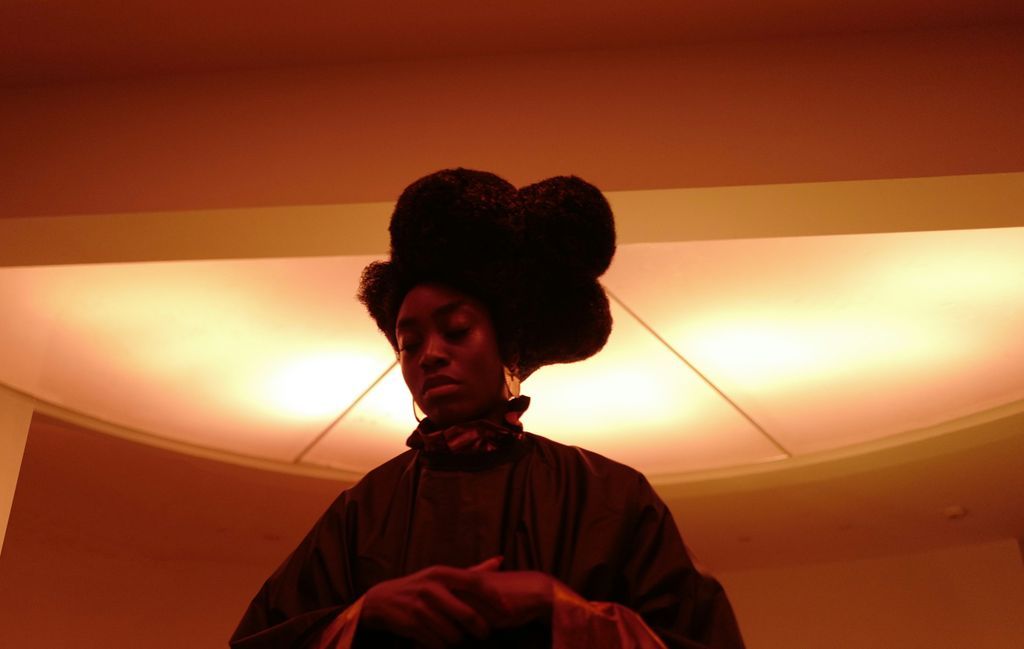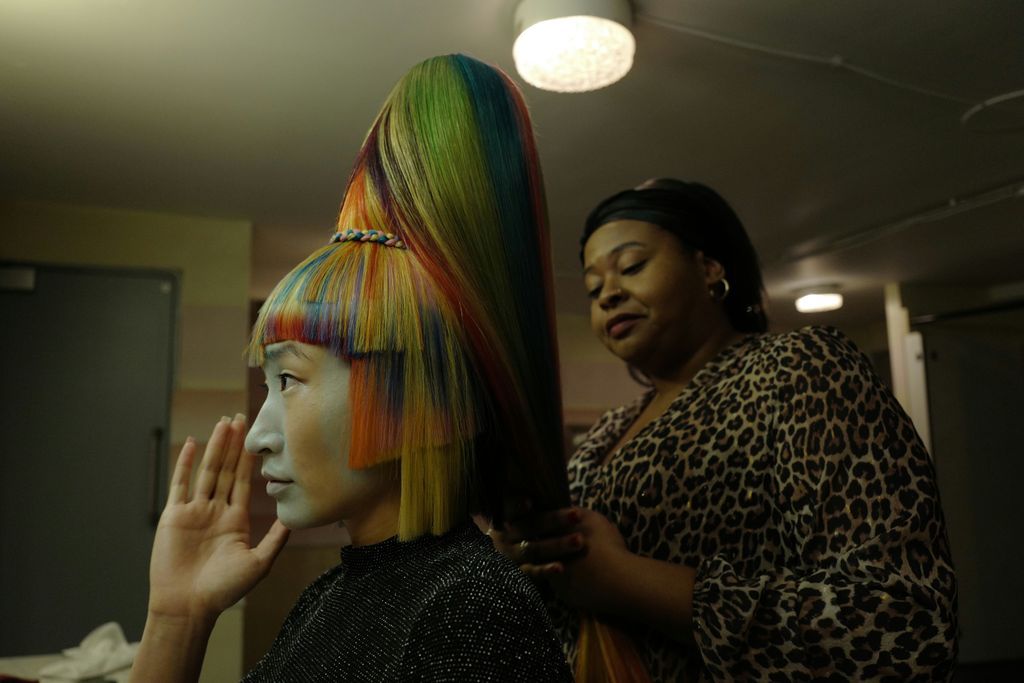|
Interview by Sean Boelman
Thomas Hardiman’s one-take hairdressing murder mystery Medusa Deluxe made a big splash at last year’s Locarno Film Festival, where A24 quickly picked it up for American distribution. A dazzling technical feat, it is one of the most ambitious directorial debuts of the year.
We at disappointment media got the opportunity to talk with Hardiman about the inspiration behind the film, as well as some of the film’s unique messages and themes. Check out the full interview below! On Medusa Deluxe's Technique and Style
disappointment media: What was the inspiration for Medusa Deluxe and telling this story as a seemingly unbroken shot?
Thomas Hardiman: The inspiration behind the film is that I want to put hairdressing on a pedestal. I want people to go, “Wow, hairdressing is flippin’ amazing!” At the same time, I make absurdist comedy. I want things to be kind of dramatic and kind of comedic and fun at the same time. So it's that knife edge and hairdressing gives you it. It's how people present themselves to the world. It has a kind of cultural value. You've also got the backbiting, the salon gossip. And you can pinball between the two — that’s comedy. In terms of the one shot, the specific inspiration is taken from my niece, actually, who was watching long hairdressing and makeup tutorials on YouTube. I just felt like they were taking media in a completely different way to what we had all grown up with. Like, you and I are talking on Zoom right now. We're getting used to this. This is how we inhabit the world with cameras now. And for a filmmaker, it just gives you incredible opportunities. Like with a murder mystery, you would cut for a red herring or a clue. But you're not gonna cut — it's gonna become a character drama, and it changes storytelling. And you get so excited by those possibilities. You want to go, “How can I make something emotional, heartfelt, comedic with this radically new technology and this radically new media landscape?” disappointment: Ever since Birdman re-popularized the long take format, opponents have criticized it for being “gimmicky.” How do you think Medusa Deluxe avoids the gimmick? Hardiman: To be honest, gimmicky is a funny, particular word. When people say phrases like, “style over substance,” I think they're sometimes easy catch-alls, and I don't think they're necessarily engaged with the topic on the level it deserves. If you look at, let's say, a one-take, filmmaking is connected to technology and things changing. Sound at one point was a fad. Color at one point was a fad. Every single technology is always a fad at some particular point. And I don't think it’s necessarily true. Those ones, obviously, are not, but I think having this potential to use cameras in slightly different ways is just reflecting modern life. The way we'll shoot on our iPhone is just standard to anyone. Anyone might do a 10 minute shot on their iPhone, that's just the normal world. And as filmmakers, all we're doing is responding to contemporary life. So for me, if you're coming from a point of view of being genuinely interested in the modern media landscape and character, and putting people in a space and world, you're never going to have a problem with being gimmicky because you're coming from a classic cinema point of view. A second ago, I was talking about 12 Angry Men. Sidney Lumet famously changed the camera's view during the film. It starts high, goes middle, and then goes low to increase the claustrophobia. We're all doing the same things. This is an AR rig Steadicam. There are times in which you want to increase the claustrophobia, so you go low. There are times when you want to orbit someone to work with the geography of the space. Those things are, in one sense, incredibly new and modern, and we can do them because of modern technology, and in another sense, it's traditional filmmaking. I feel like if you're doing that, alongside thinking about characters and their emotional sensibility at that moment, you're always on. disappointment: I think one of my favorite things about Medusa Deluxe compared to other one-take films is how seamlessly you weave between characters — both in terms of the camera and narratively. How did you plan this effect? Hardiman: Nashville, Altman, Slacker — those things are really important to me. I love ensemble dramas. You know, cinema, generally, is going to tell the story of two or three people, but occasionally, you get these filmmakers who are like, “I want to tell the story of an entire city. I want to tell the story of an entire community.” And I just find that incredibly exciting. That kind of broader canvas, that level of ambition where you're really shooting for the stars. In terms of meeting characters and being in the space with characters, I've thought for a long time. In a film, traditionally you'll have backstory, or you'll have someone who announces themselves, whereas my experience of meeting people is that you don't tell someone your entire backstory when you meet them. You create a portrait of someone through the little things that they say and the time that you're spending with them. That's how I approach filmmaking, and that's how I approach inhabiting spaces with characters. I feel like it comes from a place of reality, actually. So hopefully, the seamlessness of going between people is reflective of actual, genuine life experience because this film is on this knife edge between reality and incredibly heightened absurdism. And that's also something I love. I feel like realism is an interesting thing because a lot of people associate realism with something that's quite dour. And yet you happen to be with people sometimes when they are in the saddest moment of their lives, and it's so strange how comedy is used in those situations to lighten the moment. And I feel like comedy is almost the most realistic art form. We'll probably laugh a few times during this interview. It's just a way of humans interacting with each other that's sometimes not associated with realism in the way that I think it should be. On the Themes of Medusa Deluxe
disappointment: I think one of my favorite moments in the film is when Clare Perkins’s character talked about how hairstyling was this service profession, but it has allowed her to do something meaningful and beautiful. Why do you think the message of lower-to-middle class workers taking what are effectively crafts and turning them into art is so resonant?
Hardiman: I genuinely want to put hairdressing specifically on a pedestal. But I guess there's something that's reflecting on my family in this film. My mum's an Irish immigrant, so it is kind of like the characters in this film are my family. She grew up in East London, which was going through a pivotal time during her lifetime. There was a lot of immigration, so my family is incredibly diverse. So it's trying to find a way to tell stories that can be inclusive and reflective of modern Britain. At the same time, it's giving the respect that I feel a lot of crafts deserve. I hate this kind of, “This can be in a gallery, or this can be in a cinema, or this can be in a book,” culture. I just think it's rubbish. I think that all these people are singing from the same hymn sheet and deserve the same level of respect we give any other art form. Specifically with hairdressing, Eugene Solomon, who did the hair on this film, he's a very famous hairdresser, and I think the best hairdresser in the world. And I begged him to do this film. But when you look at the way he's crafting hair, he's working with the exact same kind of creative framework that a contemporary sculptor works with. He's doing the same thing. And that's what I want to shout from the rooftops. I want to say that all this craft and passion that people have for their industry, I have a real respect for it. Like when someone gets into weaving and then you have a conversation with them about weaving, there's an entire history there. There's an entire world, and suddenly, not only do you learn about their incredible weaving, you learn about them as a person. You understand why they did this, and I love those things as a conduit to character and personality. disappointment: Obviously salon gossip plays a big role in Medusa Deluxe, but I think gossip and murders go hand in hand as well. Like when there’s a death, people often start to spread rumors. How did your film explore this macabre connection between death and gossip? Hardiman: That's a great question actually. It's funny, right? Because yeah, I love gossip, I'm not gonna lie. I don't work in an office anymore, so if I ever go into an office, as soon as I can find out who fancies who, who's going out with who, I'm all over it. But then there's something else in it that is like gossip. These things, which can be really frivolous and silly in one sense, when they go from micro to macro on a kind of societal level, can become very dangerous and they can become mean. Like bullying is completely linked to gossip a lot of the time. And it's very interesting how everything you engage with, even if it feels silly, and something you might dismiss, has this kind of interesting duality. I guess that’s something I write about quite a lot. And what my characters are interested in is how things are always two things at once. How things can on one side be fun, and on another side, be spiteful. I guess it's that butterfly effect, isn't it? Something that feels very small and dismissible here suddenly grows into something that's incredibly big and either good or dangerous.
Medusa Deluxe hits theaters and VOD on August 11.
0 Comments
|
Archives
March 2024
Authors
All
|
|
|
disappointment media
Dedicated to unique and diverse perspectives on cinema! |


